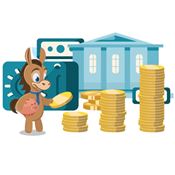CIT Bank Savings Builder vs Money Market
CIT Bank offers both money market and savings accounts. But which is better to keep your money safe? Find out how to choose between the two.
 |
Traditional banks are kind of a bummer. Many of them charge monthly maintenance fees and offer rock-bottom APYs to boot.
About 28% of American adults have no savings set aside. So if you're in the market for a bank account to stash your money, congratulations!
You could keep your money in a traditional bank, an online bank, or under your mattress. (Actually, let's avoid that last one.) But CIT Bank is one of the best options for a secure account with high rates.
Between the Savings Builder and Money Market accounts, which one will give you the best bang for your buck? Find out the pros and cons of both accounts below.
CIT Savings Builder vs. Money Market account
CIT Bank's Savings Builder and Money Market accounts are both great choices for stashing your savings. Honestly, the accounts are very similar. They'll both keep your money safe and are backed by the FDIC.
Both accounts need a $100 minimum to open and there are no monthly fees. What differs between the two is the interest rates and how you can earn that rate. Check out the requirements to get the highest rate for each account:
 |  | |
| Get Deal | Get Deal | |
CIT Savings Builder - 1.00% APY | CIT Bank Money Market Account - 1.55% APY | |
|---|---|---|
CIT Savings Builder - 1.00% APY - | CIT Bank Money Market Account - | |
| APY | ||
| How to Get Highest APY | Monthly deposit of at least $100 OR balance of at least $25,000 | |
| Minimum Deposit Required | ||
| Get Deal | Get Deal | |
Blank fields may indicate the information is not available, not applicable, or not known to CreditDonkey. Please visit the product website for details. | ||
The Savings Builder has a tiered interest system. If you don't make the minimum $100 monthly deposit or maintain a balance of $25,000, you'll get a lower rate. The Money Market offers a higher rate that applies to all account balances without extra requirements to maintain a high APY.
While the requirement might seem like a drawback to the Savings Builder, it can be a great motivator to regularly contribute to your savings. With the Money Market account, you can get away with neglecting your savings.
Savings Builder pros and cons
Pros
- No monthly fees
- Low minimum to open
- Incentivizes you to contribute to savings to get highest APY
Cons
- Low APY if you don't meet requirements
- Lower APY than some competitors
- High balance requirement if you don't deposit $100 a month
Money Market pros and cons
Pros
- No monthly fees
- Higher APY than Savings Builder
- No requirements to get highest APY
Cons
- Some competitors offer higher rates
- Limited to electronic transfers only
- No debit/ATM card or check-writing ability
Which is best for me?
As with most things, the best account for you really depends on what you need and your savings goal. For most people, the Money Market account is a better choice. It has higher rates—and you don't need to worry about meeting any requirements to get the rate.
The Savings Builder has its merits too. Because you need to deposit at least $100 per month to get the high APY, it motivates you to keep growing your savings. The account really lives up to its name!
The accounts are really similar, so you can't go wrong with either one. If you want the highest APY possible, go for the Money Market account. If you want a bit of help to increase your savings, go for the Savings Builder.
Bottom line
CIT Bank offers safe, secure accounts to store your money. The Savings Builder and Money Market accounts are great for emergency funds or to save for a home.
All CIT Bank accounts have zero monthly fees and higher interest rates than traditional banks.
Figure out what's most important to you: getting the highest APY or an extra push to contribute to your savings. No matter which you choose, remember to keep saving whenever you can. Future you will definitely thank you.
CIT Bank Platinum Savings - 5.00% APY
- 5.00% APY with a balance of $5,000 or more
- 0.25% APY with a balance of less than $5,000
- $100 minimum opening deposit
- No monthly maintenance fee
- Member FDIC
Discover® Online Savings - $200 Cash Bonus
To qualify for Bonus: Apply for your first Discover Online Savings Account, enter Offer Code CY624 at application, deposit into your Account a total of at least $15,000 to earn a $150 Bonus or deposit a total of at least $25,000 to earn a $200 Bonus. Qualifying deposit(s) may consist of multiple deposits and must post to Account within 45 days of account open date. Maximum bonus eligibility is $200.
What to know: Offer not valid for existing or prior Discover savings customers, including co-branded, or affinity accounts. Eligibility is based on primary account owner. Account must be open when bonus is credited. Bonus will be credited to the account within 60 days of the account qualifying for the bonus. Bonus is subject to tax reporting. Offer ends 09/12/2024, 11:59 PM ET. Offer may be modified or withdrawn without notice. See advertiser website for full details.
Chase Total Checking® - $300 Bonus
- New Chase checking customers enjoy a $300 bonus when you open a Chase Total Checking® account with qualifying activities
- With over 4,700 branches, Chase has the largest branch network in the U.S. plus access to more than 15,000 ATMs.
- Chase Mobile® app - Manage your accounts, deposit checks, transfer money and more -- all from your device.
- JPMorgan Chase Bank, N.A. Member FDIC
- Open your account online now
- Available online nationwide except in Alaska, Hawaii and Puerto Rico. For branch locations, visit locator.chase.com.
- Chase Overdraft Assist℠ - no overdraft fees if you're overdrawn by $50 or less at the end of the business day or if you're overdrawn by more than $50 and bring your account balance to overdrawn by $50 or less at the end of the next business day*
Bank of America Advantage Banking - $200 Bonus Offer
- The $200 bonus offer is an online only offer and must be opened through the Bank of America promotional page.
- The offer is for new checking customers only.
- Offer expires 9/30/2024.
- To qualify, open a new eligible Bank of America Advantage Banking account through the promotional page and set up and receive qualifying direct deposits totaling $2,000 or more into that new eligible account within 90 days of account opening. Bank of America Advantage SafeBalance Banking® for Family Banking accounts are not eligible for this offer.
- Once all requirements are met, Bank of America will attempt to pay bonus within 60 days.
- Additional terms and conditions apply. See offer page for more details.
- Bank of America, N.A. Member FDIC.
Donna Tang is a content associate at CreditDonkey, a bank comparison and reviews website. Write to Donna Tang at donna.tang@creditdonkey.com. Follow us on Twitter and Facebook for our latest posts.
Note: This website is made possible through financial relationships with some of the products and services mentioned on this site. We may receive compensation if you shop through links in our content. You do not have to use our links, but you help support CreditDonkey if you do.
|
|
|
Compare:






